Low-cost luxury

A store attendant arranges handbags at a secondhand luxury goods store. Photo: IC
For eight years, Bai Xiaojing dreamed of owning a Louis Vuitton (LV) blue denim handbag. She browsed websites and fashion catalogues eyeing other more affordable accessories, but nothing could diminish her LV obsession.
Resisting the temptation to buy an identical knockoff at a Beijing market, the advertising clerk finally fulfilled her fantasy in March by buying her dream handbag for 4,800 yuan ($780) - roughly half its retail price.
The reason it was so cheap was that it had a previous owner.
Bai, 29, is one of a growing number of young Chinese professionals turning to secondhand luxury stores to buy authentic high-end goods at lower prices.
"I longed to own the handbag for years, but when I was a university student I never even thought about buying luxury goods. By the time I had decided to buy it, the design I wanted was no longer in stock," says Bai, who bought her "80 percent new" LV handbag at secondhand luxury goods outlet Siku Consignment Store.
"It feels almost no different from owning a new one," Bai insists of her handbag.
China has about 600 secondhand luxury stores catering to consumers who share similar tastes to the nouveau riche yet balk at the country's high import taxes.
"Market demand has skyrocketed over the past two years nationwide. Secondhand luxury goods have also diversified from fashion accessories and clothes to yachts and cars," says Zhou Ting, director of the Fortune Character Institute, which researches lifestyle trends of the wealthy.
Feng Tian, co-owner of CBD secondhand luxury goods store Touch, opened her store in 2009 after seeing the popularity of overseas consignment stores and experimenting by selling secondhand handbags to friends.
"Customers are excited to track down and purchase handbags, especially if a particular design or brand is exclusive," says Lei Yu, Touch's other co-owner.
A steady flow of customers trickles through the store's doors even on weekdays, browsing some of the 400 handbags sporting designer labels including LV, Chanel, Prada and Gucci. Wrapped in plastic and lining shelves, everything about the bags looks new except for their price tags.
Prices for most bags start at 2,000 yuan, a fraction of their retail cost. There are also other fashion accessories including watches, high heels, boots, coats and belts.
Feng, 32, says most sales are done on consignment, with her business making 15 percent on sales. To instill consumer confidence, all goods undergo assessment to ensure they are genuine. Handbags are also disinfected before being sealed in plastic.
A study by consulting firm Bain & Company last year found Chinese shoppers are responsible for 25 percent of global luxury goods spending.
But the government's anti-extravagance campaign introduced in December 2012 to combat corruption has slowed domestic consumption of luxury goods and stalled expansion of global luxury brands in China, the International Business Times reported in May.
Nevertheless, steady business at Beijing secondhand luxury goods stores has allowed Touch to grow its customer base three-fold since 2011, notes Feng.
"We sell about 100 bags per month. Most customers are young women aged between 20 and 30 who tend to be fashion-savvy," Feng says, noting as the stigma of secondhand goods fades further businesses like hers will continue growing to cater to consumers' tastes.
"During the first two years [of business], people didn't understand that fashion accessories could be sold or keep some of their value because they are not seen in the same way as cars or real estate. Consumers are becoming increasingly accepting of secondhand goods," she says.
Evelyn Cheng contributed to this story